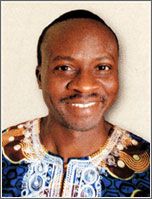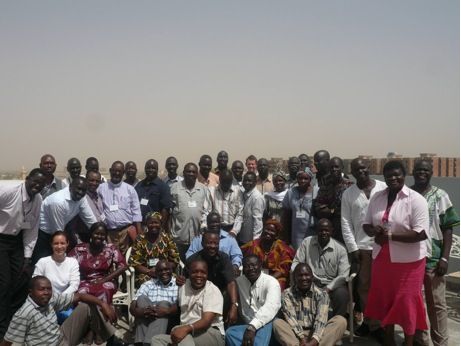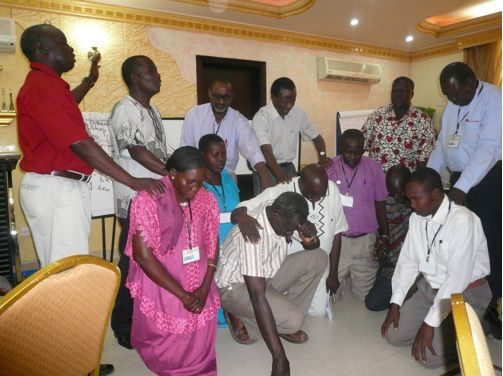
God has just opened a new door of hope in Sudan, and through Sudan, into all of North Africa.
Hope for Africa is a ten-year initiative of DNA Africa Affiliate Samaritan Strategy Africa (SSA) aimed at catalyzing a movement of church-based transformation across the continent. Since it began in 2005, over 30,000 pastors and church leaders have been impacted. National training teams (comprised of 339 certified trainers) have been established in 22 African nations. Thousands of Seed Projects have been implemented. Many have grown into significant programs: schools for slum children, micro-enterprise initiatives, HIV-AIDS related ministries, among others.
But the tremendous success experienced by Hope for Africa has has not reached North Africa.
Until now.
In March, Stephen Langa, a member of the SSA Africa Working Group and Executive Director of Transforming Nations Alliance was invited by International AID Services to conduct a one-day Vision Casting in Khartoum. Among the 40 attendees of this event were top NGO and Sudanese church leaders, including the Anglican Bishop of Khartoum and the Chairman of the Sudan Council of Churches.
These leaders were so impacted by Stephen’s presentation that they asked him to be the opening speaker at a gathering of all major Sudanese church leaders organized and hosted by the Sudan Council of Churches. This gathering was held in Juba just a few weeks later, on March 23-26.

Again, those in attendance were deeply struck by Stephen’s message. Doors were opened to conduct full, five-day Vision Conferences in Khartoum, Juba, and Yei.
Stephen and Pastor Franco Onaga of Watoto Church have already facilitated a full Vision Conference in Khartoum during the first week of June. Here are excerpts from Stephen’s June 11 report:
Pastor Franco and I have just concluded facilitating the Khartoum VC which was sponsored by International AID Services [IAS].
In a nutshell, it was one of the best Vision Conferences we have ever conducted and our sense is that this conference is going to have a significant impact in the Church and nation of Sudan. Bishop Ezekiel Kondo, Chairman of the Sudan Council of Churches who attended the conference, said at the end, “This should not be called a vision conference; it should rather be called an ‘Open Door Conference’ because it has opened a great door for the Church in Sudan”
The 50 participants were pastors, denomination leaders, mission organization leaders, theological school leaders and Christian NGO leaders. The selection was carefully made such that every participant was strategic in their own right. Three of the leaders were Eritrean and have significant contacts with the Church in Eritrea and the Diaspora.
Most of the participants said that the conference was a life changing experience.
“Every lesson that was taught contained something that was directly relevant in my life,” said one.
“There are questions I have had in my life and have not had answers to; this conference has answered them,” was the testimony of another, who has been in student ministries for many years.
Several wished that the conference would continue for several more days. Every participant left with at least one thing that they are going to do or implement within the next one week.
There was also a general feeling that this conference came at the right time to the right people. After the recent elections, tribal clashes and killing of innocent people have continued in the South. It appears that some of the army leaders from the South have joined the Islamic Northern government and are being armed to destabilize the South. It is reported that some of the leaders in the South believe that their tribe is only tribe that should rule, and that it is causing unease and dissatisfaction among other tribes. It is therefore not clear to what is going to happen after the referendum next year.
The Church in the Islamic North is still somewhat afraid to engage in open evangelism fearing attacks from the Islamic government which imposed Sharia law some time back. Although this is the situation generally, new initiatives by some Christian organizations and churches are using innovative methods to evangelize in the North.
Clearly the Church as well as the nation needs direction and transformational leadership. The Vision Conference has provided these key influential Church and Christian leaders with foundational truths, values and principles that could provide lasting solutions to problems faced by the church and the nation. The conference also exposed the church in Sudan to wholistic ministry and evangelism, which is a new concept to them. The testimonies from Watoto Church and the small groups concept opened the Church to new possibilities of ministering wholistically to the Muslim world. One pastor of a Pentecostal church in Khartoum said, “We only knew one way of evangelizing – direct evangelism. The idea of seed projects has opened our eyes to an effectively way of reaching out to Moslems”
As part of the way forward, an Interim Task Force [ITF] composed of eight leaders (six men and two women) was formed to provide leadership and coordination of the Samaritan Strategy in Sudan. Bishop Kondo is part of it and so are some key Pentecostal leaders. There was overwhelming desire to see the VC conducted in other parts of Sudan, especially the South in places such as Juba. I am going to be in touch with the task force with a view of providing guidance and mentorship.
A two-day meeting is scheduled next week between the Government of Southern Sudan and representatives of the Church in Sudan [The President of Southern Sudan is going to be present at the meeting]. Some of the representatives of the church delegation, who are going to represent the Church in Sudan at this meeting, attended the VC. Please pray that God would give the Sudanese church leaders the courage, wisdom and love to articulate God’s mind and purposes for the nation of Sudan.
Sudan is a gateway country to North Africa as it shares a common border with nine countries. The Sudanese church understands how to work in a Muslim context and is strategically located to influence the church across North Africa.
Here are a few photos from the recent Vision Conference:






Do the North want to be evangelized. Are you saying there is only one way to God?
I think you should try evangelizing the UK as the Church doesn’t have a big following there
[…] these events were key church leaders from all major denominations. For more background, read this, this, and this. Stephen challenged these church leaders to step up and play their God-given, […]